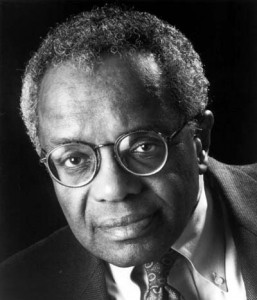Earlier this year, I contributed a piece to the Seattle Unviersity Law Review's symposium in memory of Professor Derrick Bell.
Here is the abstract for the Bell Symposium: "Derrick Bell — law teacher, mentor, scholar, activist, author, loving husband and father — larger than the sum of his many parts. The articles in this symposium are fitting tributes to his legacy and valuable contributions to Derrick’s memory."

My piece is titled "Derrick Bell and the Emergence of LatCrit Theory." An excerpt:
As no doubt many of the contributions to this memorial issue attest, Professor Derrick Bell no less than blazed the trail for generations of minority scholars to write about race and civil rights in original, dynamic, and nothing less than cutting edge ways. As we all know, he was a founder of Critical Race Theory, and authored path-breaking race and civil rights scholarship.
As is also well known, Professor Bell’s casebook, Race, Racism, and American Law, published by Little Brown & Company in 1973, is the gold standard in civil rights scholarship. When a Harvard Law School professor publishes a casebook with a major legal publisher, it lends legitimacy to a field—in this case, one that ultimately evolved into Critical Race Theory. By lending important intellectual credibility to critical race scholarship, Race, Racism, and American Law made it possible for future scholars writing civil rights scholarship to be accepted as legitimate, and, among other things, be hired and tenured at law schools across the United States. These are monumental achievements that deserve acclaim and recognition.
In the limited space that I have, my hope is to outline how Professor Bell helped spur an intellectual movement with which he has not generally been associated; namely, he helped create the intellectual space for critical Latina/o (LatCrit) theory. Professor Bell also became a role model for intellectual activism in that political movement.
My linking of Derrick Bell with the emergence of LatCrit theory at first glance may seem anomalous. He generally is not identified with LatCrit scholarship. Indeed, some LatCrit scholarship directly responded to what the writers viewed as limits to Professor Bell’s scholarly analysis.
Nonetheless, Professor Bell’s scholar ship helped fuel the creation of LatCrit theory’s exploration into peculiarly Latina/o civil rights concerns in a variety of ways. Moreover, his actions, in important respects, legitimized in legal academia the LatCrit commitment to activism.
You can read the piece -- and all of the wonderful contributions to the symposium -- at this link: http://seattleuniversitylawreview.com/files/2013/05/BellSymposiumCombined.pdf.